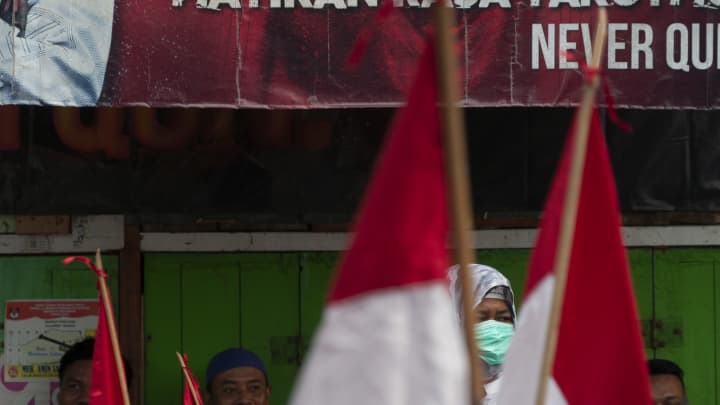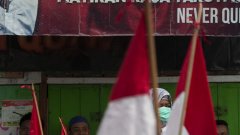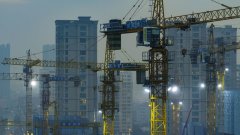
JAKARTA — Indonesia is set to choose its next president and vice president in February as it grapples with a declining opposition presence in parliament and seeks continuity of economic initiatives under President Joko "Jokowi" Widodo, who is set to step down in October.
The world's third-largest democracy casting their ballots, according to its General Elections Commission. The , though more than a million voters abroad will be able to cast their ballots earlier.
The leading pair of hopefuls is Defense Minister Prabowo Subianto and Gibran Rakabuming Raka, the mayor of Solo and Jokowi's eldest son.
Former education minister and ex-Jakarta governor Anies Baswedan, is another presidential hopeful whose running mate is Muhaimin Iskandar, chairman of the National Awakening Party (PKB).
The final duo is former Central Java governor Ganjar Pranowo and Mahfud MD, the country's political, legal and security affairs coordinating minister.
Prabowo-Gibran are leading with 46.7%, according to a Indikator Politik Indonesia poll conducted between , followed by Ganjar-Mahfud at 24.5% and Anies-Muhaimin at 21%. If no candidate wins the majority in the first round, there would be a runoff in June.
Here are some economic, electorate and diplomatic issues in the country in the run-up to the election.
Indonesia plans to to Nusantara in Borneo, a mega project with an estimated cost of over $30 billion. Presidential contenders and have pledged their commitment to building Nusantara, while has criticized the planned smart city.
"Many investors are taking a cautious approach during this transitional period in order to better evaluate the probable impact of the election on the overall investment landscape," .
Other large-scale investments include Indonesia's . The country boasts , especially for high-demand . Jokowi has courted the likes of Tesla and Ford to in Indonesia, while also banning export of certain commodities.
Voters have largely focused on the presidential election and paid less attention to the legislative polls, said Titi Anggraini, an advisory board member of the Association for Elections and Democracy (Perludem) in Indonesia.
Over four-fifths of Indonesia's current parliament is comprised of coalition parties, leaving little room for opposition representation.
"An effective parliament, which is a balancing force, is almost non-existent, but is like a chorus with the executive [branch]. It threatens democratic practices," she told CNBC.
"Controversial legislative products were very easy to pass, such as the revision, then the , then the revision."
In 2020, the job creation law triggered protests in multiple cities as concerns grew it would erode worker rights. In 2019, Indonesians . Meanwhile, the MK law revision comes as the court is responsible for settling potential election disputes this year.
While having greater opposition representation in Indonesia's parliament could raise the bar for passing such laws, Titi said there's still a very high barrier to entry for the candidacy process. She said "only the elite can break" into elected positions, which means many women, youth and marginalized members of society have little to no representation in elected office.
According to Freedom House's Freedom in the World 2023 report, . "Political parties are subject to 30 percent gender quotas for steering committees and candidates. However, women remain underrepresented in electoral politics," it wrote.
Indonesia's next leaders will also contend with a range of geopolitical issues, especially Jakarta's relationship with Beijing.
A report published by Singapore's ISEAS — Yusof Ishak Institute in early 2023 found that said China was the most influential economic power in Southeast Asia, up from 67.9% in 2022. The report surveyed 1,308 Southeast Asians, 9.3% of whom identified as Indonesian.
Indonesia's Center of Economic and Law Studies wrote in its that "China's influence is increasingly unavoidable because Indonesia is now economically dependent on China." Indonesia is home to , a project that was part of China's Belt and Road Initiative.
"Under Jokowi's administration, our relationship is now at its peak, at its best with China," Lina Alexandra, international relations department head at Indonesia's Centre for Strategic and International Studies, told CNBC, citing the rail line as an example.
But for some Indonesians, the cozier relationship has also sparked and .
A by Australian think tank Lowy Institute found respondents ranked promoting peace and conflict resolution (86%) as well as advocating for Muslim communities in other countries (78%) as more important on Indonesia's list of foreign policy goals. The report surveyed around 3,000 Indonesians between 17 and 65 years old across 33 provinces.
Lina said developments in the war between Israel and Palestinian militant group Hamas are among the most important geopolitical issues for Indonesia. The country has called for a two-state solution, while many Indonesians have protested against Israel's aggression.
All three presidential contenders have expressed support for Palestinians. the Palestinian territories if elected president. Before officially registering as a presidential candidate, frontrunner Prabowo . Former Central Java governor Ganjar was a vocal in 2023's FIFA U-20 World Cup. The tournament was set to be held in Indonesia, until FIFA stripped the country of hosting rights.
— Correction: This story has been updated to accurately reflect that more than a million overseas voters will be able to cast their ballots before Election Day. An earlier version of the story misstated the number.




